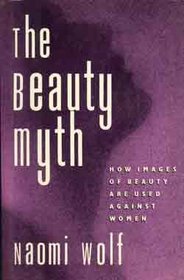Wolf was, I believe, 29 years old when the book was published, and her youth does show. Botched statistics about eating disorders, attempts to use overly flowery language when a more direct approach would have been better, and repetitive sections aside, I found this book to be a thought provoking and intriguing read. It is a bit radical in places - she borders on calling women "the beauty class" (Women are "the sex class" anyone?) but does construct a good argument to go with it.
That women are judged on appearance first and substance second is nothing new. It wasn't new in 1991 either. But Wolf's idea that we can never be beautiful is a blow to the ego. We can't satisfy the beast, and I think this is true. The beauty culture has become an expression of misogyny although it does not have to be that way.
In some ways the Beauty Myth is an expression of a racist society as well. Although she did touch on the racial politics of plastic surgery, it was only a few sentences. There is a lot to explore about racism and the beauty myth or the "white standard of beauty."
She does a good job of predicting future trends. There is really nothing off limits anymore. Some more "extreme" things start as a matter of personal preference (trimming pubic hair) grow in popularity and reach a tipping point where a woman feels extreme pressure that she must conform (you can get a Brazilian wax anywhere these days, and many younger women feel it is an absolute must - the same way my grandmother would not go out without her slip or my mother without lipstick and mascara) independent of what her male partner thinks, the Beauty Myth can be so strong that she does not believe him anyway when he tells her he she is lovely just as she is. Other times something like vaginal rejuvenation was started to help those who had fistulas or other injuries during birth. Now it's the new facelift.
In her conclusion, Wolf says she thinks that soon this will spread to men and we will see higher rates of eating disorders and low self esteem due to poor body images in boys and men. The market is saturated with messages telling women they must buy more products and services because they are not good enough.
That women are judged on appearance first and substance second is nothing new. It wasn't new in 1991 either. But Wolf's idea that we can never be beautiful is a blow to the ego. We can't satisfy the beast, and I think this is true. The beauty culture has become an expression of misogyny although it does not have to be that way.
In some ways the Beauty Myth is an expression of a racist society as well. Although she did touch on the racial politics of plastic surgery, it was only a few sentences. There is a lot to explore about racism and the beauty myth or the "white standard of beauty."
She does a good job of predicting future trends. There is really nothing off limits anymore. Some more "extreme" things start as a matter of personal preference (trimming pubic hair) grow in popularity and reach a tipping point where a woman feels extreme pressure that she must conform (you can get a Brazilian wax anywhere these days, and many younger women feel it is an absolute must - the same way my grandmother would not go out without her slip or my mother without lipstick and mascara) independent of what her male partner thinks, the Beauty Myth can be so strong that she does not believe him anyway when he tells her he she is lovely just as she is. Other times something like vaginal rejuvenation was started to help those who had fistulas or other injuries during birth. Now it's the new facelift.
In her conclusion, Wolf says she thinks that soon this will spread to men and we will see higher rates of eating disorders and low self esteem due to poor body images in boys and men. The market is saturated with messages telling women they must buy more products and services because they are not good enough.




